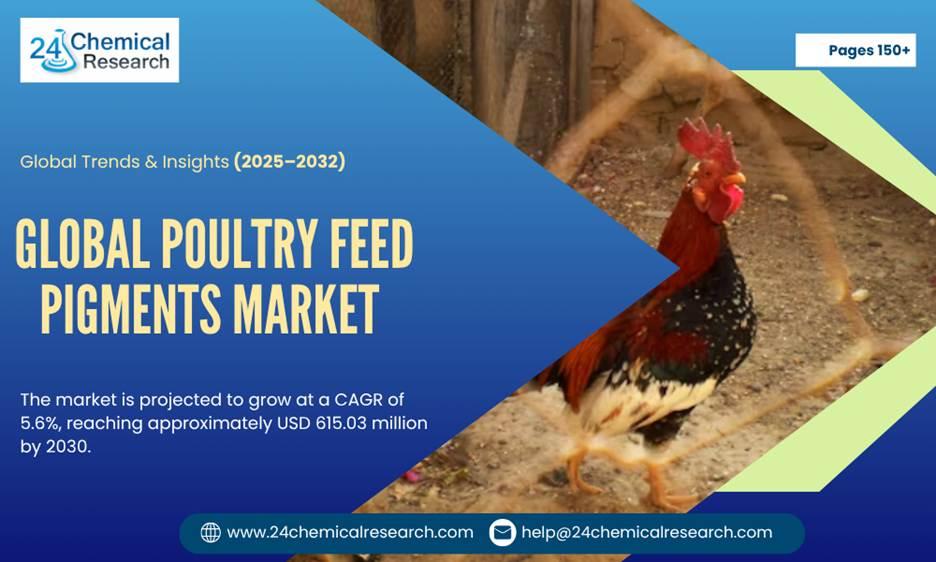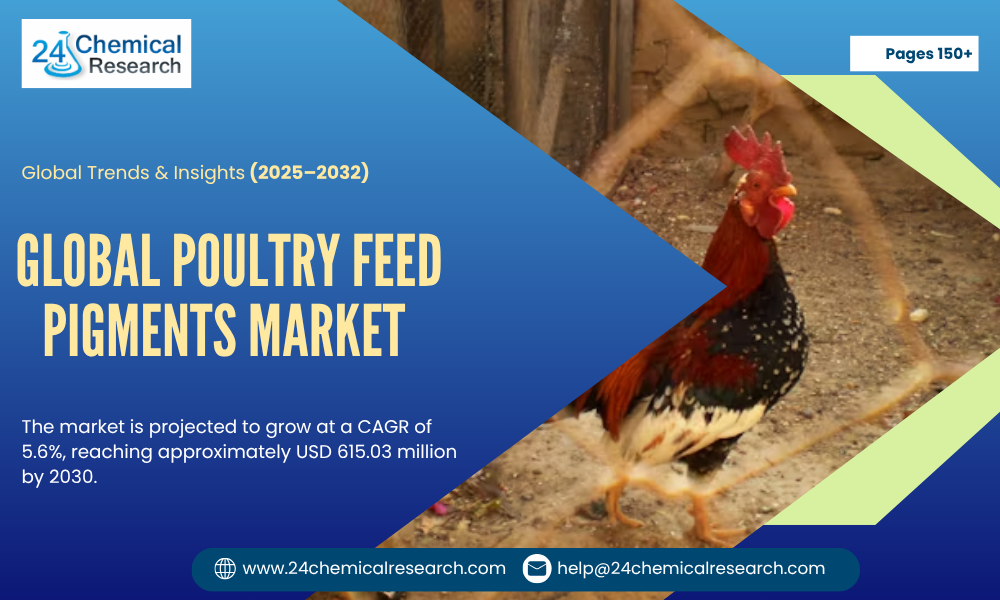Global Pigments for Poultry Feed Market continues to demonstrate robust expansion, with its valuation reaching USD 420 million in 2023. According to the latest industry analysis, the market is projected to grow at a CAGR of 5.6%, reaching approximately USD 615.03 million by 2030. This growth trajectory is primarily fueled by rising consumer expectations for visually appealing poultry products and the increasing focus on nutritional enhancement through feed additives.
Pigments play a critical role in poultry feed formulations by influencing the coloration of egg yolks, broiler skin, and other poultry products. Carotenoids like lutein and zeaxanthin not only enhance product aesthetics but also offer antioxidant benefits. As consumer preferences shift toward naturally colored poultry products, manufacturers are increasingly incorporating these additives into feed compositions.
Download FREE Sample Report: https://www.24chemicalresearch.com/download-sample/287774/global-pigments-for-poultry-feed-forecast-market-2025-2032-546
Market Segmentation Analysis:
Market Segmentation by Type
- Natural Pigments (carotenoids from marigold, algae, paprika)
- Synthetic Pigments (canthaxanthin, apo-ester)
Market Segmentation by Application
- Broiler Feed
- Layer Feed
- Turkey Feed
- Other Poultry Species
Market Segmentation and Key Players
- BASF SE
- DSM Nutritional Products
- Kemin Industries
- Novus International
- Guangzhou Leader Bio-Technology
- Vitafor NV
- Nuproxa Switzerland Ltd
- Alltech
- D.D. Williamson
- Chenguang Biotech Group
- Synthite Industries
Industry Landscape and Regional Market Trends
Asia-Pacific commands the largest share of the global poultry feed pigments market, accounting for over 45% of total consumption. The region's dominance stems from massive poultry production in China, India, and Southeast Asian countries where rapid urbanization and growing middle-class populations are driving demand for enhanced poultry products.
North America maintains steady growth through technological advancements in feed formulation and strict quality standards in poultry production. Europe shows particular preference for natural pigments with increasing regulatory scrutiny on synthetic additives. Emerging markets in Latin America and Africa present promising opportunities, though infrastructure limitations currently restrict broader adoption.
Market Growth Factors and Opportunity Landscape
The market is propelled by several converging factors. Consumer perception directly links vibrant egg yolk colors and golden broiler skin with product quality and freshness. The expanding global poultry industry - expected to reach 140 million metric tons by 2025 - provides a substantial base for pigment consumption.
Technological innovations in microencapsulation are enhancing pigment stability and bioavailability in feed. Natural pigment demand is rising alongside the organic food movement, though price sensitivity remains a challenge. Emerging applications in aquaculture and pet food represent adjacent market opportunities currently being explored by major players.
Sustainability and Future Market Trends
The pigments for poultry feed market is increasingly shaped by sustainability concerns and evolving consumer preferences. With rising awareness of food safety and environmental impact, there is a growing shift toward natural pigments sourced from marigold flowers, paprika, and algae. These plant-derived carotenoids not only provide desirable coloring for poultry products but also align with the organic and clean-label movement gaining traction in developed markets like Europe and North America.
Sustainable sourcing practices are becoming a competitive differentiator, with companies investing in vertically integrated supply chains to ensure consistent quality and price stability. Innovations in microencapsulation technology are extending pigment shelf life and improving bioavailability, reducing feed waste and enhancing nutritional value for poultry producers.
The transition toward precision feeding strategies is another key trend influencing the market. By tailoring pigment levels to poultry genetics and diet composition, manufacturers can optimize yolk and skin coloration while minimizing costs and environmental impact.
Looking ahead, expanding applications beyond poultry—such as aquaculture feed and specialty pet nutrition—offer untapped growth opportunities. As global demand for protein rises and consumers prioritize food aesthetics alongside nutrition, pigment technology will remain a critical driver of product differentiation in the broader feed additives industry.
Market Limitations and Potential Risks
The market faces several headwinds. Price volatility of natural ingredients like marigold flowers - the primary source of lutein - creates formulation cost pressures. Regulatory variations across regions complicate market entry strategies, with Europe maintaining particularly stringent approval processes for feed additives.
Consumer education gaps in developing regions limit pigment adoption, while established markets face saturation concerns. Trade barriers and geopolitical factors occasionally disrupt supply chains, as seen in recent anti-dumping measures on certain feed additives in key importing countries.
Report Scope
This report provides comprehensive analysis of the global Pigments for Poultry Feed market from 2025 to 2032, featuring detailed segmentation and regional coverage. The study includes:
- Market size and growth projections with historical data analysis
- In-depth segmentation by pigment type and poultry application
- Competitive intelligence on key players and their market strategies
- Price trend analysis and raw material sourcing insights
- Regulatory landscape assessment across major markets
The research methodology combines primary interviews with industry experts and extensive secondary research from government publications, company annual reports, and trade association data. Our analysis tracks plant expansions, technological developments, and strategic partnerships shaping the industry's future.
Get Full Report Here: https://www.24chemicalresearch.com/reports/287774/global-pigments-for-poultry-feed-forecast-market-2025-2032-546
Access more Related report-
Contact Us:
Email: help@24chemicalresearch.com
International: +1(332) 2424 294 | Asia: +91 9169162030
Website: https://www.24chemicalresearch.com/



